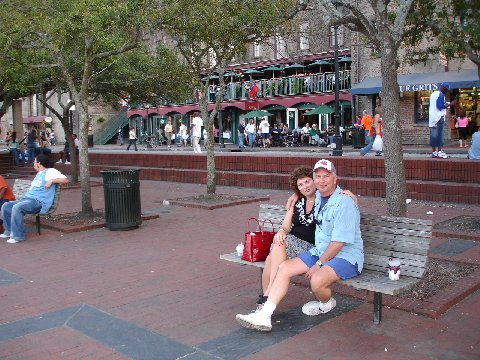 Shrine near Central World where we walked to in Procession
Shrine near Central World where we walked to in Procession Another view of the Shrine at Central World
Another view of the Shrine at Central World  this is the Thai family we spent Songkran with
this is the Thai family we spent Songkran with  This was the Mom, they called her Boss
This was the Mom, they called her Boss We arrived in Bangkok on April 12, so we had 3 full days of the Songkran Festival. Thank God for the hotel laundry as we didn't have a dry set of clothes between us by the end. Greg had gone out walking while I had my first of many massages. When he got back he said that a Thai family who owns a cafe down the street invited us to spend Songkran with them. We walked to the cafe and the waterworks proceeded. The day ended with the neighborhood walking in procession to the local Shrine to pay homage. It was there that Greg & I were approached and interviewed by a Thai news program.
It is the custom to slather powder on the faces of those you are giving a blessing too as well as pouring water down their backs. Older folks will have a perfumed water poured over their hands. I bought a bottle of this perfumed water as everything seems to be scented with it. Thai Whiskey also seems to be a big part of the custom. This day was also my first experience with the eastern squat toilet. To make the event even more memorable both my husband and I needed the lone squat toilet with urgency. If one cares to imagine two people sharing a squat toilet I can attest it can be done.
*********************
*********************
from Wiki
The Songkran festival (Thai: สงกรานต์, from Sanskrit saṃkrānti,[1] "astrological passage") is celebrated in Thailand as the traditional New Year's Day from 13 to 15 April. It coincides with the New Year of many calendars of South and Southeast Asia.
The date of the festival was originally set by astrological calculation, but it is now fixed. If these days fall on a weekend, the missed days off are taken on the weekdays immediately following. If they fall in the middle of the week, many Thai take off from the previous Friday until the following Monday. Songkran falls in the hottest time of the year in Thailand, at the end of the dry season. Until 1888 the Thai New Year was the beginning of the year in Thailand; thereafter 1 April was used until 1940. 1 January is now the beginning of the year. The traditional Thai New Year has been a national holiday since then.
Songkran has traditionally been celebrated as the New Year for many centuries, and is believed to have been adapted from an Indian festival. It is now observed nationwide, even in the far south. However, the most famous Songkran celebrations are still in the northern city of Chiang Mai, where it continues for six days and even longer. It has also become a party for foreigners and an additional reason for many to visit Thailand for immersion in another culture.
The Songkran festival (Thai: สงกรานต์, from Sanskrit saṃkrānti,[1] "astrological passage") is celebrated in Thailand as the traditional New Year's Day from 13 to 15 April. It coincides with the New Year of many calendars of South and Southeast Asia.
The date of the festival was originally set by astrological calculation, but it is now fixed. If these days fall on a weekend, the missed days off are taken on the weekdays immediately following. If they fall in the middle of the week, many Thai take off from the previous Friday until the following Monday. Songkran falls in the hottest time of the year in Thailand, at the end of the dry season. Until 1888 the Thai New Year was the beginning of the year in Thailand; thereafter 1 April was used until 1940. 1 January is now the beginning of the year. The traditional Thai New Year has been a national holiday since then.
Songkran has traditionally been celebrated as the New Year for many centuries, and is believed to have been adapted from an Indian festival. It is now observed nationwide, even in the far south. However, the most famous Songkran celebrations are still in the northern city of Chiang Mai, where it continues for six days and even longer. It has also become a party for foreigners and an additional reason for many to visit Thailand for immersion in another culture.











No comments:
Post a Comment